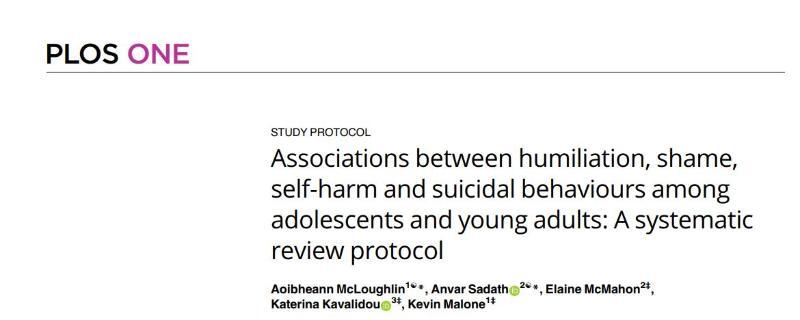Congratulations to Dr Anvar Sadath, Dr Elaine McMahon, Dr Katerina Kavalidou and colleagues on their excellent work!

Suicide is the second leading cause of death among young people worldwide and remains a major public health concern.
Research indicates that negative social contexts involving familial and peer relationships, have far-reaching influences on levels of suicidal behaviours in later life.
Previous systematic reviews have focused on evaluating associations between negative life events such as abuse and bullying in childhood and subsequent self-harm or suicidality. However, the association between adolescent experiences of humiliation and shame, and subsequent self-harm or suicidal behaviour among children and young adults has not been well examined.
As such, this systematic review is conducted to examine the prevalence and association between humiliation and shame and self-harm, suicidal ideation, and death by suicide among adolescents and young adults.
Congratulations to Anvar Sadath, Elaine McMahon, Katerina Kavalidou and colleagues on their excellent work just published in respected journal PLOS ONE.
McLoughlin et al 92022) Suicide.
Recent NSRF Publications - September to November 2022
Substance use and self-harm emergency department presentations during COVID19: evidence from a National Clinical Programme for Self-Harm
Dr Katerina Kavalidou is a co-author on a paper in the Irish Journal of Psychological Medicine!
Synopsis: COVID-19 was significantly linked with self-harm presentations to Emergency Departments due to substances. Suicide-related ideation increased after May 2020 indicating longer term effects of pandemic and its relevant restrictions.
Read the paper in full here: https://tinyurl.com/2hha9bne
Dialectical Behavior Therapy for individuals with Borderline Personality Disorder
Dr Mary Joyce is a co-author on a systematic review in the Journal of Personality Disorders led by HSE colleague Dr Conall Gillespie!
Synopsis: Effects of DBT in treating borderline personality disorder are maintained at least 1 to 2 years postintervention. Given a lack of long-term follow-up in randomized controlled trials, evidence for the efficacy of DBT in the longer term is unclear.
Download the paper here: https://tinyurl.com/3se4u7u
Real-time suicide surveillance supporting policy and practice
Dr Ruth Benson, Dr Paul Corcoran and Prof Ella Arensman are co-authors on a paper in Global Mental Health!
Synopsis: The importance of real-time suicide surveillance supporting policy and practice is outlined, focusing on public health and humanitarian crises.
Read the paper in full here: https://tinyurl.com/42eupjr7
The development and validation of a dashboard prototype for real-time suicide mortality data
Dr Ruth Benson, Dr Paul Corcoran and Prof Ella Arensman are co-authors on a paper in Frontiers in Digital Health!
Synopsis: Integration of a cluster detection approach involving geo-visualisation techniques, space-time scan statistics and predictive modelling can facilitate prospective early detection of emerging clusters, at-risk populations, and locations of concern.
Read more here: https://tinyurl.com/2rfnxvf2
Time of self-harm presentations to hospital emergency departments
Dr Mary Joyce is a co-author on a paper in Social Psychiatry and Psychiatric Epidemiology led by Royal College of Surgeons in Ireland colleague David McEvoy!
Synopsis: Self-harm presentations tend to occur outside of working hours (09:00–17:00, Mon to Fri). Peak time was in the hours before and after midnight.
The paper is available to download here: https://tinyurl.com/2jp245j9
Mental health following an initial period of COVID-19 restrictions
Dr Isabela Troya, Dr Mary Joyce and Prof Ella Arensman are co-authors on a paper in HRB Open Research!
Synopsis: As the COVID-19 pandemic continues, the impact on mental health in the population as a whole and in specific subgroups must be considered.
Access the paper here: https://tinyurl.com/2p9x7y86
After Words: A survey of people bereaved by suicide in Ireland report published
Ireland’s First National Suicide Bereavement Survey ‘AfterWords - A survey of people bereaved by suicide in Ireland’, a collaboration between the NSRF and HUGG, was launched by Minister Mary Butler on Tuesday 11th October 2022 at an event hosted by the Lord Mayor of Dublin, Caroline Conroy, at the Mansion House, Dublin.
The launch was followed by a key stakeholder workshop, which generated important action points and priority recommendations to inform service development and policy, along with further research in this area.
Read the report here: https://tinyurl.com/mrt4ajxp
Real-Time Suicide Surveillance: Comparison of International Surveillance Systems and Recommended Best Practice
Dr Ruth Benson, Dr Paul Corcoran and Prof Ella Arensman are co-authors on a paper in Archives of Suicide Research!
Synopsis: Highlights include evidence-informed recommendations for current best practice in real-time suicide surveillance in addition to a comprehensive framework that can be adapted based on available resources and capacity.
Read more here: https://tinyurl.com/yckn79kn
Preventing Suicide in Health Systems: How Can Implementation Science Help?
Prof Ella Arensman is a co-author on a paper in Archives of Suicide Research led by University of Massachusetts colleague Dr Celine Larkin!
Synopsis: Implementation science can help to close the gap between evidence-based and routine practice, improving delivery of suicide-related interventions.
Access the paper here: https://tinyurl.com/6hy3hb5n
The effectiveness of organisational-level workplace mental health interventions on mental health and wellbeing in construction workers
Dr Caleb Leduc, Dr Clíodhna O’Brien, Dr Paul Corcoran and Prof Ella Arensman are co-authors on a systematic review in Plos One led by UCC School of Public Health colleague Dr Birgit Greiner!
Synopsis: The evidence for the effectiveness of organisational-level workplace mental health interventions in construction workers is limited with opportunities for methodological and conceptual improvement. Recommendations include the use of a wider range of mental health and wellbeing outcomes, interventions tailored to the specific workplace and culture in construction and the application of the principles of complex interventions in design and evaluation
Read the paper here: https://tinyurl.com/5n99vftm
School of Public Health
Scoil na Sláinte Poiblí
Contact us
4th Floor, Western Gateway Building, Western Road,
